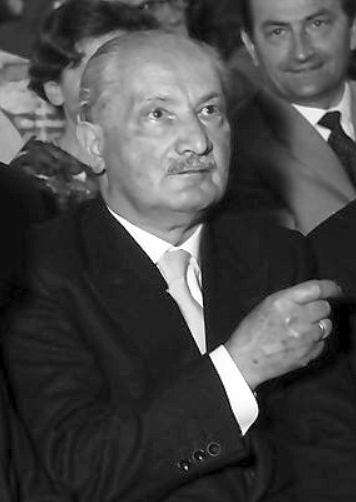Martin Heidegger Frases famosas
“A grande tragédia do mundo é que não cultiva a memória, e portanto se esquece dos mestres.”
Atribuídas
Fonte: Super Interessante – ANO 9 - Nº 5 – Maio de 1995 - Dito & Feito - Pág; 90
“A poesia é a fundação do ser pela palavra.”
citado em "Poesia brasileira contemporânea" - página 165, Alceu Amoroso Lima - P. Bluhm, 1941 - 169 páginas
(Martin Heidegger, Hólderlin und das Wesen der Dichtung, in "Mesures" 15|7|37, p. 121).
Atribuídas
“Nunca chegamos aos pensamentos. São eles que vêm.”
Wir kommen nie zu Gedanken. Sie kommen zu uns.
Aus der Erfahrung des Denkens, 1910-1976 - página 78, Martín Heidegger - V. Klostermann, 1983 - 253 páginas
Citações de idade de Martin Heidegger
Citações de homens de Martin Heidegger
Martin Heidegger frases e citações
“Por que há simplesmente o ente e não antes o nada?”
"Heidegger: introdução a uma leitura" - Página 79 http://books.google.com.br/books?id=Bwt9Jh3y0RQC&pg=PA79, CHRISTIAN DUBOIS, Jorge Zahar Editor Ltda, 2000, ISBN 8571108234, 9788571108233 - 248 páginas
Atribuídas
Martin Heidegger: Frases em inglês
“In its essence, technology is something that man does not control.”
Der Spiegel Interview with Martin Heidegger, 1966
“We ourselves are the entities to be analyzed”
Macquarrie & Robinson translation, ¶9
Being and Time (1927)
Introduction: The Exposition of the Question of the Meaning of Being (Stambaugh translation)
Being and Time (1927)
Introduction: The Exposition of the Question of the Meaning of Being (Stambaugh translation)
Being and Time (1927)
Introduction: The Exposition of the Question of the Meaning of Being (Stambaugh translation)
Being and Time (1927)
What Is A Thing? (1935, 1968)
is historical, because every report of the past, that is of the preliminaries to the question about the thing, is concerned with something static. This kind of historical reporting is an explicit shutting down of history, whereas it is, after all, a happening. We question historically if we ask what is still happening even if it seems to be past. We ask what is still happening and whether we remain equal to this happening so that it can really develop. p. 43
What Is A Thing? (1935, 1968)
We lay this written statement beside the thing of which it is the truth. After the lecture is finished both doors are opened, the classroom is aired, there will be a draft, and the scrap of paper, let us suppose, will flutter out into the corridor. A student finds it on his way to the cafeteria, reads the sentence. "Here is the chalk," and ascertains that this is not true at all. Through the draft the truth has become an untruth. Strange that a truth should depend on a gust of wind. ... We have made the truth about the chalk independent of us and entrusted it to a scrap of paper. p. 29-30
What Is A Thing? (1935, 1968)
